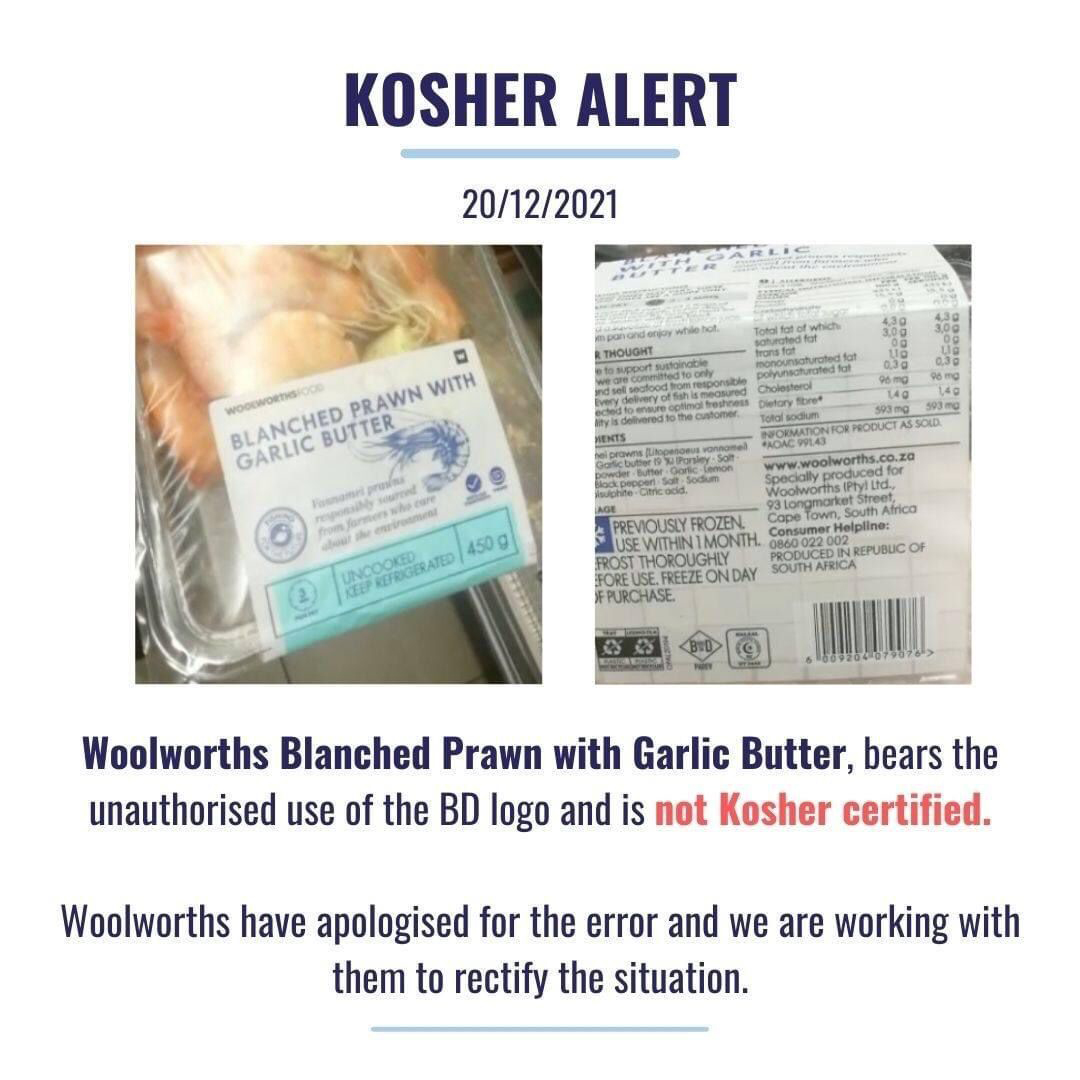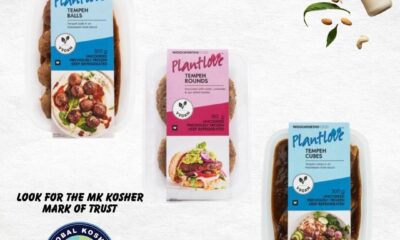
Lifestyle

‘Kosher’ prawns and mussels spark packaging alert
For some Jews, kosher prawns and mussels would be a dream come true. So, when it emerged in December 2021 that two local treif seafood products had a United Orthodox Synagogues (UOS) Beth Din kosher hechsher on their packaging, many laughed it off as a humorous error.
Others took it more seriously, saying that if prawns can be labelled kosher, there may be mistakes where the distinction isn’t so clear cut.
The prawns were a Woolworths product, while the mussels were from Shoprite.
“The erroneous use of the Beth Din logo on products is nothing new,” says a member of the local Kosher Consumers Organisation (KCO), speaking on condition of anonymity. “It happens from time to time and occurs throughout the world. It’s acceptable, and mistakes do happen, but only up to a point. We’re concerned about the frequency with which this is happening in South Africa. Almost every alert which goes out is about products which contain the logo when they shouldn’t, or products which contain the incorrect designation of parev or dairy. As consumers, it’s impossible to keep track. It also makes one question the reliability of the logo when it does appear on a product.
“Chocolate, cold drinks and the like is one thing, but prawns and mussels is another completely,” the consumer says. “This is unacceptable. It speaks to a breakdown in controls and systems of monitoring and approval. In an age of fake meat and fake cheese, the damage that can be done by the Beth Din logo on non-kosher seafood can be immeasurable. The response from the UOS has been tepid – one email sent to the community. One email only. What about people who have no email? Where’s the urgency?”
The KCO points out that “the treif seafood which bears the Beth Din logo is made in Cape Town. The latest extremely confusing alert which went out about wine which has the Beth Din logo on it, but also the Hebrew words ‘not kosher’ is also a product made in Cape Town. Following the passing of Rabbi Desmond Maizels a year ago, the UOS of Johannesburg has taken over the kashrus operations of Cape Town.”
The group says it remains anonymous because it’s fearful. “We wish we could be open, but one cannot tackle the establishment these days without repercussions. We understand that our anonymity may prevent us from being taken seriously, and that’s a price we need to pay. But we’re concerned for our livelihoods. The Kosher Consumer Organisation of the 70s to the 90s was a powerful force in the community. Times have changed, the community has changed. But it had a great history and was well-received by the community.”
Commenting on the treif seafood labelling saga, UOS Kosher Department Managing Director Rabbi Dovi Goldstein says the error lies with the companies concerned. “Woolworths and Shoprite are longstanding and major clients of the Kosher Department, with thousands of kosher-certified products on their shelves. Both companies have been committed to the Jewish community for years and were most apologetic and co-operative in rectifying the problem when this printing error was brought to their attention,” he says.
“In both instances, the mislabelled products were brought to our attention by members of the community. Unfortunately, errors like these occur from time to time all around the world. When we were made aware of them, we remedied it by notifying the community via email and our various social-media channels, and we contacted the companies and had the products removed from their stores or the logo covered, to which they agreed.
“Where issues of mislabelling occur, we work with manufacturers to address the issue to ensure it doesn’t happen again and notify our community immediately,” Goldstein says. “In addition, over the holiday period, Villa Cape wine was also seen on shelves bearing an unauthorised logo, together with the Hebrew lettering stating ‘not kosher’. This was an unauthorised use of our logo, and the company in question has also been contacted and the products recalled from the shelves.
“The reality is that we have tens of thousands of products with our logo on the shelf, which is positive for the kosher consumer. The community is our eyes and ears on the ground, and may very well spot a labelling error on packaging on the shelf before we do as the kosher department. We have recently established a dedicated email for community members to send this kind of information through to our team. If you come across any product that bears our logo and seems unauthorised, please email notkosher@uos.co.za with a photograph and the details of the packaging, and we will investigate.”
Woolworths spokesperson Kirsten Hewett said, “We apologise for this labelling error. Accurate, transparent, and helpful product labelling is very important for our customers. The kosher authority notified us of the packaging error on 20 December 2021.
“We immediately removed all the incorrectly labelled products from our store shelves on 20 December. As an interim measure, a sticker will cover the kosher logo on the packaging while the label is being corrected. While we do have procedures in place to prevent mistakes, we are reviewing these procedures and will implement further controls to prevent errors in future.”
One community member complained directly to Woolworths, and shared extracts of the response he received. “Our technical team was extremely concerned to hear about the matter. All factories producing products for Woolworths are audited independently by various inspection services to ensure that the highest standards are maintained.
“Following your complaint, we have conducted a full investigation with the manufacturer which involves a detailed investigation of the label printing and approval process. We have identified the error, and have corrected it immediately. We have addressed this with our supplier and reinforced the importance of following the correct labelling procedure. We take pride in adhering to the correct kosher practices when manufacturing and packing our kosher products,” the company wrote.
The Shoprite media team said, “The supermarket chain would like to apologise to its loyal customers for oversight of this labelling error. It has already agreed with the UOS of South Africa and Kosher SA to ensure that the packaging is updated and correctly labelled in its next packaging print run. A kosher alert was subsequently issued detailing the particulars.”










